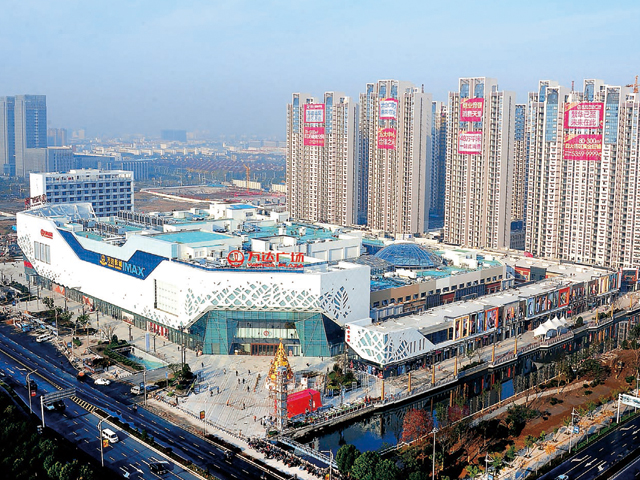The Chinese economy of this day and age is characterized by rapid changes. Who are the entrepreneurs facilitating the changes in the Chinese economy? Under what circumstances are they making their impacts? Can these impacts be sustained?
The study of economic change is the study of behavior of participants of economic activities. Assuming that they are economic-minded and they pursue economic interests, their behaviors can be understood as maximizing interests under the constraints of limited resources. However, this article only offers a qualitative rather than quantitative assumption. It will explain and forecast economic reform through economic perspectives; it will also propose policies to improve the economy.
Private enterprises offer high efficiency and output value
 The importance of implementing the market economy can be observed from the history of China over the past six decades. Growth was slow during its time as a planned economy. It was only after economic reform kicked off in 1978 that the GDP growth rate was able to increase at the average rate of 9.4% per year over the next 30 years. The GDP growth rates of advanced countries such as the US do not normally exceed 2 to 3% per year.
The importance of implementing the market economy can be observed from the history of China over the past six decades. Growth was slow during its time as a planned economy. It was only after economic reform kicked off in 1978 that the GDP growth rate was able to increase at the average rate of 9.4% per year over the next 30 years. The GDP growth rates of advanced countries such as the US do not normally exceed 2 to 3% per year.
The importance of implementing the market economy can be observed from the history of China over the past six decades. Growth was slow during its time as a planned economy. It was only after economic reform kicked off in 1978 that the GDP growth rate was able to increase at the average rate of 9.4% per year over the next 30 years. The GDP growth rates of advanced countries such as the US do not normally exceed 2 to 3% per year.
If entrepreneurs are the locomotives for growth in the Chinese economy, the large population of China creates an even more favorable backdrop for economic development, which is propelled by a small number, probably the smartest 200 entrepreneurs. Since the Chinese population is four times bigger than that of the US, the 200 smartest entrepreneurs would be better than their American counterparts. Secondly, a country with a large population offers a huge market. Now that the global economy is amalgamated, one could say the entire global market is the market for each and every company. Yet, as export involves transportation costs and usually tariffs, a vast domestic market is favorable for enterprises.
Chinese entrepreneurs mostly built their businesses from the ground up
 Assuming entrepreneurs are change agents, they each has different abilities, but most of them built their businesses from the ground up. These are the major features of Chinese entrepreneurs. In the early 1980s, China was generally poor. In other words, all high potential entrepreneurs began from the same starting line with no inherited wealth.
Assuming entrepreneurs are change agents, they each has different abilities, but most of them built their businesses from the ground up. These are the major features of Chinese entrepreneurs. In the early 1980s, China was generally poor. In other words, all high potential entrepreneurs began from the same starting line with no inherited wealth.
There were 251 Chinese on the 2015 Forbes Rich List, a number that was only second to the US. Chinese entrepreneurs are successful in different fields. I am impressed by Wang Yung-ching from Taiwan and Li Ka-shing from Hong Kong. They never received much education, and both began from low-paid jobs. Yet, they have outstanding business skills and acumen. Many leading Chinese entrepreneurs share similar qualities.
Natural talents, hard work and education are the three major factors that underpin the success of an entrepreneur. Natural talents are the most important of all. With natural talents, success is possible without higher education. Wang Yung-ching, Li Ka-shing and my father Chow Tin-pong, who served as a leader of the financial industry of Guangdong province in the early republic years and over 20 years as the Chairman of the Chamber of Commerce of Guangzhou, are obvious examples. Hardworking and perseverance are certainly essential, but they do not only apply to entrepreneurs. The importance of education can be shown by the number of applicants who are willing to study MBA and EMBA programs.
Successful entrepreneurs think like successful economists. They first identify and get to know important issues. They then find simple solutions. Steve Jobs, who headed US company Apple Inc, was aware of the needs of the market, and he discovered the new simple function yet to be known by other people – using the finger to control the iPhone.
Examples of successful Chinese entrepreneurs
The Chinese economy has already gone through the initial development stage, meaning its GDP growth will gradually slow down. However, competent entrepreneurs are still able to propel the development of the Chinese economy like they used to, provided they have the vision to discover new markets and the creativity to manufacture new products.
A few years ago, I visited Wenzhou to observe the operation of Dahu Lighter Factory, a global market leader. The company’s leader Zhou Dahu was a former state-owned enterprises worker. When he was laid off, he only made one to two lighters per day. He later founded his own company. When I was visiting, the company has already taken up more than one-fourth of the world’s lighter market. Shi Zhengrong is another example. He has a doctorate in Physics and founded Suntech Power, a solar panel manufacturer, in late 1990s after he had returned from Australia. Five years later, Suntech became the world’s second largest solar panel producers, only preceded by First Solaris of the US. At the same time, Shi Zhengrong became the richest person in China of the time. The third example is BYD Auto Co Ltd of Shenzhen. Founded by its chairman Wang Chuanfu in 2003, the company has sold 448,400 electric cars. In December 2008, BYD launched its first mass-produced, plug-in hybrid vehicle, the BYD F3DM to the world. On the same day, Warren Buffet invested USD 230 million on 10% stake in BYD.
Wang Jianlin is the fourth example. He is now one of the most successful Chinese entrepreneurs. According to information from Baidu, Wang Jianlin began serving as the Chairman of the Dalian Wanda Group in 1993. He has built four major industries for Wanda, namely commerce, cultural tourism, e-commerce, and a department store chain. As of 2014, the company’s total asset amounted to RMB534.1 billion, earning annual revenue of RMB242.48 billion.
No matter which area chosen, the most successful people must possess natural talents. The natural talents of an entrepreneur include his ability to understand, his competence to respond to the complex market situation with ever-changing circumstances, and to anticipate market changes. First class professionals must be groomed by first class teachers, but naturally talented entrepreneurs are able to learn by themselves.
The most successful entrepreneurs need an enormous market to work with. China has a vast geographical span, abundant resources, a large population and a sizeable market that enables competent entrepreneurs to put their talents to work. Competent Chinese entrepreneurs are also able to make use of the world market and expand their businesses to other countries. Wang Jianlin, for example, expanded his business enterprise to the US and other countries.
There are countless successful entrepreneurs in China. While not all of them are as successful as Wang Jianlin, but jointly they have been facilitating the high speed growth and prosperity of the Chinese economy for the past 30 years.
Macroeconomic controls offer stable business environment
 I believe the most critical change is the economic innovation promoted by entrepreneurs. Perhaps my readers do not agree with me, but this article can still explain and forecast the impact of Chinese entrepreneurs over the path of change.
I believe the most critical change is the economic innovation promoted by entrepreneurs. Perhaps my readers do not agree with me, but this article can still explain and forecast the impact of Chinese entrepreneurs over the path of change.
The government has a direct impact on economic changes. This article is concerned with the impact of the government over the course of providing an innovative environment for entrepreneurs. The macroeconomic control policy of the Chinese government has offered a stable economic environment for entrepreneurs. Unlike the US, China is not subject to the limitations of an independent legislative body. This aspect could affect the macroeconomics of China, and indirectly affect the environment for entrepreneurs.
The global economy has been declining recently, but China does not have a similarly serious economic crisis because the government does not allow its financial institutions to take as much risk as their US counterparts. In the US, issuers of derivative securities can create financial assets with large fluctuations in values. Yet, there is no requirement that they must possess adequate capital to bear the risks arising from such. The financial crisis of the US clearly illustrates that free trade can lead to extreme risks and economic chaos. The Chinese government is gradually opening up for the introduction of financial derivatives. Whether it is the government or the public, consumers of Chinese financial derivatives are not able to undertake that much risk. As most banks in China are state-owned, account holders do not need to worry about the safety of their money. As such, the banking system is relatively robust. The economic environment for entrepreneurs is much more stable than that of the US in many aspects.
My forecast is: successful changes will continue unless there are changes in the incentives for entrepreneurs or in the competencies of entrepreneurs (which is extremely unlikely), or the environment becomes unfavorable. In different possible changes, the worst case scenario is the disappearing of opportunities for innovation. Economist Joseph Schumpeter shared this view. In his classic Capitalism, Socialism and Democracy published in 1947, he stressed that the distinguished works of entrepreneurs would eventually exhaust all opportunities, and the opportunities for innovation would eventually disappear. Yet, since 1947, events taken place have proved his hypothesis incorrect.
Actualizing evolution of the market mechanism through enterprises
When the economies of the rest of the world are stagnated, the Chinese economy is growing. It is quite simple to put forward improvement proposals, such as opening up the RMB to a wider extent. For government officials, there are risks to allow rapid appreciation of the RMB, as substantial opposition is expected. Another feasible way is to use large quantities of foreign reserve in exchange for economic development in China. The development of the West is an example. Otherwise, these foreign reserves would not have been effectively used.
Through economic reform, the Chinese government has established a market mechanism. The next step is to introduce more freedom into the market mechanism, primarily through the hard work of entrepreneurs, to realize the natural evolution of the market mechanism. There are other examples from the world that, given enough economic freedom, the market mechanism would naturally evolve towards a more reasonable direction. The culture can only change slowly over time. By improving civic education, the government can enhance the public’s cultural enrichment. I consider this factor as a part of investing in human assets. Through all-round education and a comprehensive medical healthcare system, and also by cancelling the barriers of workforce transfer, the government can naturally improve the formation of its human assets.




